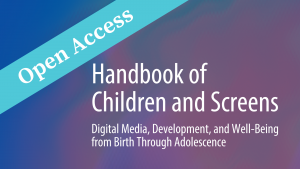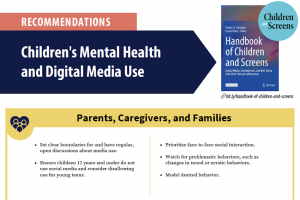
In 2024, the U.S. Surgeon General called for social media warning labels in light of the current youth mental health crisis. The research findings presented in this section of “Handbook of Children and Screens: Digital Media, Development, and Well-Being from Birth Through Adolescence” support the claim that children’s increased digital media use has a significant impact on mental health. The direction of these associations, however, is inconsistent. As highlighted by the authors, not all youth have profoundly negative experiences with social media. This is because personal factors, such as identity, play a role in youth susceptibility to these harms. In particular, cisgender girls, marginalized youth, youth from low socioeconomic backgrounds, and youth with pre-existing mental health susceptibilities are more likely than other groups to experience psychological harm with digital media use. These personal factors influence youths’ motivations to use digital media, the content they engage with, and how they respond to that content. In this way, digital media use can both contribute to and protect against mental health challenges. An overview of the current research findings for digital therapeutics and their effectiveness in youth is provided at the end of this section of the handbook.
Recommendations [ALL]
The following recommendations are excerpts from the "Digital Media and Mental Health" section of the “Handbook of Children and Screens: Digital Media, Development, and Well-Being from Birth Through Adolescence." This open access publication is free to download in full or by individual chapters via the links provided following the recommendations below.
- Discuss screen use and mental health in routine child wellness visits.
- Provide parents/caregivers with relevant resources.
- Develop, standardize, critique, and disseminate evidence-based evaluations, preventions, and interventions for media-related mental health challenges.
- Prioritize interventions for diverse and marginalized groups.
- Stay updated on digital therapeutics and use a consistent framework for evaluating and adopting these tools.
- Set clear boundaries for and have regular, open discussions about media use.
- Ensure children 12 years and under do not use social media and consider disallowing use for young teens.
- Prioritize face-to-face social interaction.
- Watch for problematic behaviors, such as changes in mood or erratic behaviors.
- Model desired behavior.
- Monitor and self-regulate social media use with healthy tech guides.
- Eliminate social media use for school communication.
- Train school affiliates to manage students’ problematic social media posts.
- Implement individually tailored social media literacy programs in the classroom that mitigate mental health concerns.
- Require social media companies to:
- Develop and implement human-centered designs that address developmental considerations, promote health, and mitigate harm.
- Adapt privacy algorithms to accommodate children under 13.
- Have their products evaluated by psychological experts.
- Enforce objective means for age verification and limit feature availability to young children.
- Raise the minimum age for social media use to 16.
- Build infrastructure to help underserved communities access digital treatments.
- Require full transparency of funding sources and data sharing for regulatory approval of new pediatric digital health interventions.
- Invest in research on adolescent social media use and mental health concerns.
- Partner with key informants and stakeholders.
- Establish clear and effective policies for mental health-related posts and provide resources to at-risk users.
- Promote positive stories related to mental health recovery.
- Ensure technologies do not perpetuate existing inequities.
- Include media use measures in youth-focused mental health research.
Digital Media and Mental Health Section Chapters
Introduction to the Section on Digital Media and Mental Health
Paul Weigle, MD
Social Media and Youth Mental Health: A Departure from the Status Quo
Sarah M. Coyne, PhD, César Escobar-Viera, MD, PhD, Mesfin A. Bekalu, PhD, Linda Charmaraman, PhD, Brian Primack, MD, PhD, Reem M.A. Shafi, MBBS, Patti Valkenburg, PhD, Kofoworola D.A. Williams, PhD, MPH
Youth and Anxiety in the Digital Age: Present Status and Future Considerations
Merlin Ariefdjohan, PhD, MPH, Jacqueline Nesi, PhD, Benjamin Mullin, PhD, Matthew Pesko, MD, Sandra Fritsch, MD, MSEd
Social Media and Depressive Symptoms
Jean M. Twenge, PhD, Dale Peeples, MD, Reem Shafi, PhD, MBBS, Elroy Boers, PhD, Lauren Hale, PhD, Paul Weigle, MD
Media Influences on Self-harm, Suicidality and Suicide
Kaylee P. Kruzan, PhD, Jacqueline Nesi, PhD, Jessica L. Hamilton, PhD, Carol Vidal, MD, PhD, Jean Twenge, PhD, Dale Peeples, MD, Thomas Niederkrotenthaler, PhD
Social Media Use, Body Image Concerns, and Disordered Eating Among Adolescents
Sophia Choukas-Bradley, PhD, Anne J. Maheux, PhD, Jennifer Stevens Aubrey, PhD, Linda Charmaraman, PhD, Megan Maas, PhD, Jacqueline Nesi, PhD, L. Monique Ward, PhD, Chia-Chen Yang, PhD
Who is Most at Risk?: Identifying Risk for Mental Health Problems Related to Social Media
Jessica L. Hamilton, PhD, Kaylee P. Kruzan, PhD, Hannah Szlyk, PhD, Jazmin Reyes-Portillo, PhD, Candice Biernesser, PhD, CSW, Michaeline Jensen, PhD, Jamie Zelazny, PhD, MPH, RN, Brian Primack, PhD, John Torous, MD, Paul Weigle, MD
Digital Therapeutics in Child Psychiatry: Harnessing Technology to Treat Pediatric Mental Health
Meredith Gansner, MD, Nicholas C. Jacobson, PhD, Lisa A. Marsch, PhD, and Randy Kulman, PhD






